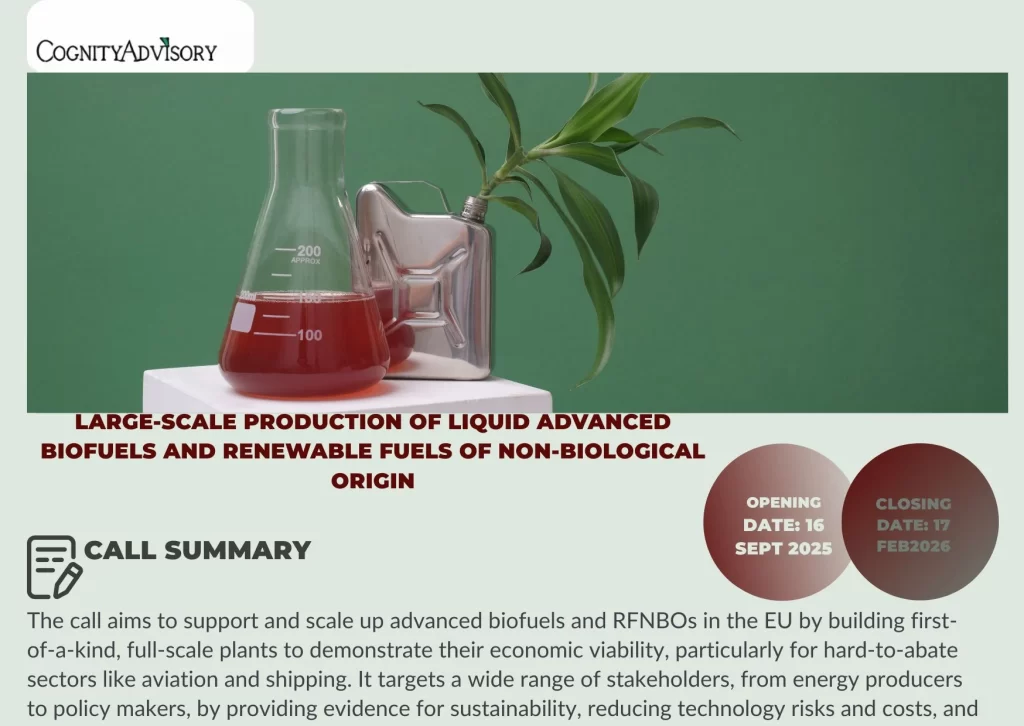HORIZON-CL5-2026-02-D3-01
General information
Programme
Horizon Europe (HORIZON)
Call
Cluster 5 Call 02-2026 (WP 2025) (HORIZON-CL5-2026-02)
Type of action
HORIZON-IA HORIZON Innovation Actions
Type of MGA
HORIZON Action Grant Budget-Based [HORIZON-AG]
Forthcoming
Deadline model
single-stage
Planned opening date
16 September 2025
Deadline date
17 February 2026 17:00:00 Brussels timeTopic description
Expected Outcome:
A quite wide portfolio of technologies, which are close to be deployed but still lack the real-world demonstration of economic viability, exists. Significant volumes of advanced biofuels and renewable fuels of non-biological origin (RFNBOs) are needed to cover the current fleets and the sectors where renewable fuels are the main long-term solution, such as aviation and shipping and energy-intensive industries. Therefore, an exceptional effort is needed to establish more successful projects where full-scale plants are built and operated based on the vast potential of sustainable feedstocks throughout the EU.
Project results are expected to contribute to all of the following expected outcomes:
- Energy producers and consumers in transport and energy-intensive industries benefit from the mobilisation of building of industrial capacity for advanced biofuels and renewable fuels of non-biological origin;
- Technology developers benefit from the support to the preparation of first-of-a-kind plants of advanced biofuels and/or renewable fuels of non-biological origin to become precursors for the following commercial plants;
- Technology providers benefit from the de-risking of the innovative technologies, reduction of CAPEX and production costs, boosting of scale-up and contribution to market up-take of advanced biofuels and/or renewable fuels of non-biological origin;
- Public authorities, citizens, researchers, and industrial stakeholders benefit from the improvement of the sustainability, reliability, robustness, and security of the relevant value chain;
- National authorities profit from the provided evidence for innovative advanced biofuels and/or renewable fuels of non-biological origin technologies, which can contribute to the Renewable Energy Directive indicative target for innovative renewable energy technology in each Member State of at least 5 % of newly installed renewable energy capacity by 2030, as well as to the targets under ReFuelEU Aviation and FuelEU Maritime.
- Policy makers and regulators profit from the provided factual information and evidence in view of their decision as regards accelerating permitting procedures, harvesting benefits from multiple uses of land and water and increasing the responsiveness of research and innovation in that field to diverse societal interests and concerns;
- The implementation of the Strategic Energy Technology Plan (SET Plan) Action for Renewable Fuels and Bioenergy is supported and facilitated.
Scope:
Demonstrate innovative large-scale production of liquid advanced biofuels and/or renewable fuels of non-biological origin for sectors with specific need for such fuels (particularly aviation and shipping and energy-intensive industries). Production is expected to be based on various EU sustainable biomass feedstocks, notably biogenic residues and wastes, biogenic part of slurries and industrial wastes, and/or on non-biological origin feedstocks, such as renewable hydrogen and CO2 or renewable carbon, nitrogen, or their compounds, through chemical, biochemical, biological, and thermochemical pathways, or a combination of them. Proposals are expected to:
- demonstrate large scale production of ready-to-deploy advanced biofuels and/or renewable fuels of non-biological origin, engaging feedstock developers and suppliers, technology developers, fuel suppliers, end users for purchasing the quantities, national bodies, and public or private authorities with funding capacity;
- address and assess the impact of actual, real-size feedstocks, (like for example agricultural wastes, energy crops grown on marginal and degraded lands or as intermediate crops, forestry wastes, biogenic municipal and industrial wastes, all types of renewable hydrogen, actual streams of CO2 and nitrogen, available renewable carbon or their compounds), in terms of their constitution on plant design, (e.g. for feedstock pretreatment and wastewater treatment as appropriate);
- address and assess the impact on plant design and feasibility of improving the feedstocks externally and upstream to the fuel production plant, by increasing the energy density of the feedstocks through for example torrefaction, by homogenisation of feedstocks for making them uniform or similar, and by standardisation of feedstocks, as appropriate.
Projects should produce a lifetime cycle analysis of their production route and in particular for renewable fuels of non-biological origin, as inputs in terms of renewable energy and material (CO2, nitrogen, renewable hydrogen) may not be continuously available.
Production of renewable hydrogen as an end-product is excluded from the scope of this topic.
The projects are expected to result in reference cases for ready-to-build, revamp/reuse and/or operate full-scale plants of advanced biofuels and/or renewable fuels of non-biological origin. Improvements, optimisation, new schemes and modification of existing demonstration plants that can result into the preparation of the next full-scale plant are considered within scope to encourage deployment of cost-effective solutions.
